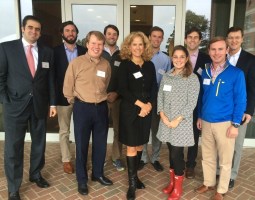News & Stories
Family business leaders benefit from peer groups

Fall 2015 Family Business Alumni Roundtable
Leading a family business is a challenging job. If you are a family member working in your family business, it also can be difficult to find people who ask you hard questions, give you honest feedback and hold you accountable. Yet this is precisely what you need to become a stronger, more successful leader.
The Alumni Leadership Roundtable was created at the request of former UNC Kenan-Flagler family business students who are currently in leadership roles in their family firms. These alumni wanted an opportunity to step away from the day-to-day demands of their business and take time to thoughtfully focus on their leadership development with a group of their peers.
Eight family business alumni came together to form the Family Enterprise Center’s inaugural Leadership Roundtable. These leaders represent significant multi-generational companies from North Carolina, Pennsylvania, Texas, Georgia, Tennessee, Florida, Louisiana and Jordan. They plan to meet twice a year to focus on one significant challenge they each face. The group will help members brainstorm solutions to their challenges, identify the best plan of action and hold them accountable to implement the plan before the group meets again. Members also benefit from the group’s diverse experiences and family business structures.
Research-based
Next-generation family business leaders face a set of challenges unique to family-owned businesses. They must not only meet the challenges of sustaining a successful business, but must also negotiate the complexities of the family and ownership systems that are integral components of family enterprises, often while living in the shadow of a successful entrepreneur who happens to be a father, mother or other close relative.
Our research shows that to be successful as a next-generation leader, it is critical to develop certain skills and capabilities. A key finding in this research shows that the degree to which next-generation leaders assume personal responsibility for their actions and decisions is strongly related to their display of emotional and social intelligence competencies, which in turn are the major drivers of their leadership effectiveness. Next-generation leaders’ acceptance of personal responsibility is also strongly related to the degree to which these leaders are held accountable by others, which positively affects their engagement with work in the family firm.
The Roundtable is built upon these findings. Each assignment and meeting discussion is designed to help create opportunities for leadership development and personal responsibility on the job.
Tips for creating a similar peer group:
- Identify six-to-eight family business peers willing to commit to meeting two or more times per year.
- Define the goal of the group and member expectations.
- Create a code of conduct for the group that stresses confidentiality.
- Agree upon meeting format, including length of meetings, facilitation and participation expectations.
- Be a “net giver.” Commit to putting in more to help your fellow peers than you expect to get back.
By Cooper Biersach (BA ’91, MBA/JD ’96), co-founder and director of the Family Enterprise Center